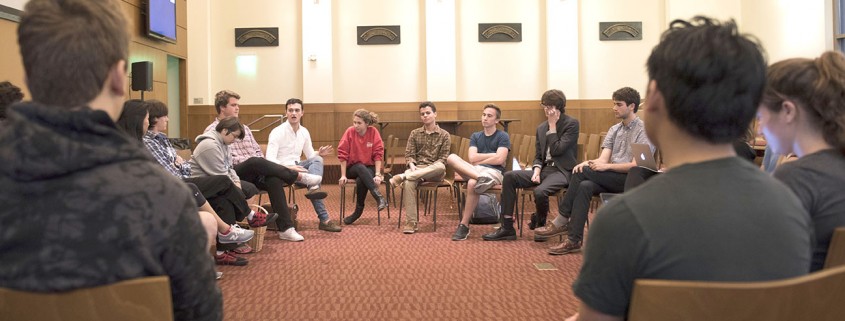PSA says election contains unconventional candidates
Members of the Political Student Assembly met Monday night to discuss the significance of “anti-establishment” candidates and agreed that the prominence of unconventional candidates appears to be a strong theme in the upcoming election.
Republican, Democratic and unaffiliated students alike voiced their opinions in the discussion forum, which centered around understanding what constitutes an anti-establishment candidate and why this election cycle features these candidates so prominently.
In an election year where three of the top Republican presidential candidates — Donald Trump, Ben Carson and Carly Fiorina — have never held political office, and the second-highest polling Democratic contender — Sanders — is a self-proclaimed socialist, students acknowledged that the upcoming primary seems to have a theme of unconventional candidates.
However, students disagreed over exactly how to define an anti-establishment candidate, as well as what constitutes the establishment in the first place.
“I would characterize [the establishment] as orthodox thought,” said Jonathan Gunn, a junior majoring in economics. “An anti-establishment candidate is someone who differs. Both Trump and Sanders are very idiosyncratic, and they both have Democratic and Republican views. I think it’s interesting to see these candidates mixing ideas, and that’s what makes them anti-establishment.”
Others, such as USC College Republicans President Jacob Ellenhorn, believed that despite lacking any connection to the “establishment,” unconventional candidates such as Trump or Fiorina still display certain similarities to their more orthodox counterparts.
According to Ellenhorn, though one does not need political experience to run for president, other qualifiers still apply.
“I think you do need experience leading a large organization of some kind, whether that be a large business or a hospital, to show that you are capable of leadership of a large operation such as the U.S. government,” Ellenhorn said. “I don’t think we’re going to see a candidate who has been a stay-at-home mother or father their whole life anytime soon.”
Along with attempting to define what it means to be pro- or anti-establishment, the discussion also tackled the question of why many unconventional candidates are dominating the current political stage. Some, such as Alec White, former president of the USC College Democrats, believed that support for “anti-establishment” candidates has long been a hallmark of the Democratic Party dogma.
“The phrase ‘Democrats fall in love, Republicans fall in line’ definitely still applies,” White said.
Other students disagreed, citing both historical and contemporary political examples to argue that there is no established party preference for unconventional or conventional candidates.
Despite any implied variation along party lines, however, many students agreed that in the current election cycle, voters are increasingly supporting anti-establishment candidates because of a desire for change.
“What [voters] are interested in is seeing the way that the system is working to change,” Ellenhorn said. “They want to work within the system to reform it.”
Ultimately, PSA leaders such as Jenny Di, a junior majoring in policy, planning and development and economics, believe that these voters include college students, who benefit from the kind of open discussion that is currently taking place regarding anti-establishment candidates.
“I think [this discussion] is important because a lot of times these candidates appeal to younger generations … who have seen a lot of problems in the federal government and want to see a major overhaul,” Di said. “I think it’s important for us to get all of our opinions out there and to hear everyone else’s opinions.”

